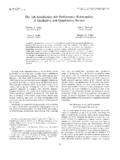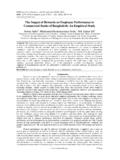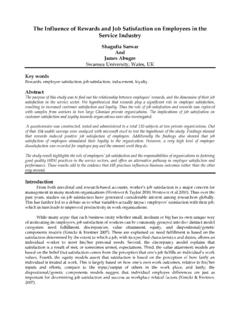Transcription of The coach–athlete relationship: a motivational model
1 The coach athlete relationship : a motivational modelGENEVIE`VE A. MAGEAU and ROBERT J. VALLERAND*Laboratoire de recherche sur le comportement social, De partement de psychologie, Universite du Que bec a` Montre al, CasePostale 8888, Succursale Centre-Ville, Montre al, Que bec H3C 3P8, CanadaAccepted 17 July 2003 The aim of this paper is to present a motivational model of the coach athlete relationship that describes howcoaches may influence athletes motivation. In line with cognitive evaluation theory (Deci and Ryan, 1980,1985) and the hierarchical model of intrinsic and extrinsic motivation (Vallerand, 1997, 2000), a motivationalsequence is proposed where coaches personal orientation towards coaching, the context within which theyoperate, and their perceptions of their athletes behaviour and motivation influence coaches behaviours.
2 Also,coaches behaviours in the form of autonomy-supportive behaviours, provision of structure and involvementhave a beneficial impact on athletes needs for autonomy, competence and relatedness, which, in turn, nurtureathletes intrinsic motivation and self-determined types of extrinsic motivation. Here, we first review coaches autonomy-supportive behaviours. We then describe the psychological processes through which coachingbehaviours have a positive influence on athletes intrinsic and self-determined extrinsic motivation. Finally, weidentify social and personality processes that determine coaching : autonomy-supportive behaviours, interpersonal style, intrinsic motivation, self-determined domains are more befitting than sport to induceinterest, enjoyment and excitement in its who regularly engages in sport knows how itfeels to be completely immersed in the activity, to bask inthe moment and to let intrinsic enjoyment guide one sactions.
3 Many elite athletes have emphasized their lovefor their sport and the intense sensations they feel whenthey engage in their activity. Besides the obvious affectiveconsequences of intrinsic motivation, being engaged insports out of enjoyment and fun has been shown to be animportant determinant of sport persistence and perfor-mance (Vallerand and Rousseau, 2001).Silken Laumann, a famous Canadian rower, lovedthe special combination of grace and power of her her, the movement of her boat through water feltlike flying (Laumann, 2001). Clearly, Laumann wasintrinsically motivated towards rowing. However, shealso endorsed the values of her sport and believed in theimportance of what rowing represented.
4 It is Lau-mann s dedication to the sport she loved that caught theimagination of people around the world in the 1992 Olympics. Faced with a terrible injury 10 weeks beforethe Olympics, she underwent five operations and wasback in her rowing shell within a month. She won thebronze medal in Barcelona and became a symbol ofcourage and determination. Laumann valued whatrowing brought to her life: What you remember , shesaid, is the process what you learn about yourself bychallenging yourself this way .. the honesty that thetraining demands. It builds character (Jones, 1996).Laumann was intrinsically motivated towards row-ing but she also had a strong self-determinedextrinsic motivation.
5 Deci and Ryan (1985, 2000)proposed that extrinsic motivation can either be self-determined or non-self-determined. To the extentthat the extrinsic reasons for doing the activity areinternalized and accepted by the person, extrinsicmotivation will be self-determined. In such circum-stances, the person fully endorses the values under-lying his or her sport and volitionally engages in theactivity. Conversely, non-self-determined extrinsicmotivation occurs when the person feels pressuredand obligated to engage in the activity by eitherexternal ( one s coach) or internal ( one sfeelings of guilt) forces. Research has shown that,like intrinsic motivation, self-determined types ofextrinsic motivation are also important determinantsof sport persistence and performance (Vallerand andRousseau, 2001).
6 Not surprisingly, the importance of*Author to whom all correspondence should be : of Sports Sciences, 2003,21, 883 904 Journal of Sports SciencesISSN 0264-0414 print/ISSN 1466-447X online#2003 Taylor & Francis LtdDOI: intrinsic motivation and self-determined extrin-sic motivation has been emphasized by sport psy-chologists ( McAuley and Tammen, 1989;Goudaset al., 1995; Vallerand, 2001). Many haveinvestigated how one can nurture these motivationsin athletes ( Ryanet al., 1984; Dwyer, 1995;Beauchampet al., 1996; Vallerand and Losier, 1999).Although many factors may impact athletes intrinsicand self-determined extrinsic motivation, the coach athlete relationship is one of the most importantinfluences on athletes motivation and subsequentperformance.
7 Laumann and the Canadian rowingteam witnessed the tremendous difference coachescan make. After disappointing results in the SeoulOlympics in 1988, Rowing Canada hired British-bornrowing coach Mike Spracklen. Spracklen established anew and demanding programme where he made hisathletes his central focus and used their feedback toadjust his programme (Wickens, 1999). In the 80s(..) , said Worthington, a Canadian rower, somerowers were forced to scull and coaches battled eachother for athletes. In 92 .. the boats selectedthemselves. I had never seen anything so fair (Wickens, 1999). Spracklen was viewed as a mentorwho not only taught athletes technical skills, but whoalso nurtured the person as a whole.
8 Laumann hassaid of him that he was the most selfless man [shehas] ever known (Wickens, 1999), with a rare mix ofgentleness and toughness (Blatchford, 1992). He notonly knows everything about this one thing (rowing)[but] .. his joy is to see his athletes realize a dream (Wickens, 1999). Four years later in the BarcelonaOlympics, Canada s top rowers excelled, bringinghome four golds to go with Laumann s celebratedbronze. Andy Higgins, the director of the NationalCoaching Institute, saw Spracklen s success as ameasure of what a master coach can accomplish: Amateur and Olympic coaches bring a vision ofpersonal excellence [and] .. create intrinsic motiva-tion (Jones, 2002).
9 It is thus not surprising thatseveral authors such as Jowett (2000) have stressed theimportance of building an effective coach athleterelationship, as the quality of this relationship is acrucial determinant of athletes satisfaction, motivationand improved aim of this paper is to present a motivationalmodel of the coach athlete relationship (see Fig. 1)that describes how coaches may influence theirathletes intrinsic motivation and self-determined typesof extrinsic motivation. We first present an overview ofthe proposed model and then provide a brief review ofresearch on athletes intrinsic and extrinsic then present the various autonomy-supportivebehaviours (see Table 1) that have been shown tohave an impact on athletes motivation.
10 Next, wedescribe the psychological processes through whichcoaching behaviours influence athletes motivation,and we identify personality and social processes thatdetermine such behaviours. Finally, we discuss thetheoretical and practical implications of the motivational model of the coach athleterelationship in a nutshellWe propose a motivational model of the coach athleterelationship (see Fig. 1) that extends Vallerand andPelletier s (1985; see also Vallerandet al., 1987)previous motivational model . In line with cognitive Fig. motivational model of the coach athlete and Vallerandevaluation theory (Deci and Ryan, 1980, 1985) and thehierarchical model of intrinsic and extrinsic motivation(Vallerand, 1997, 2000, 2001), we propose a motiva-tional sequence where coaches personal orientationtowards coaching, the context within which theyoperate, and their perceptions of their athletes beha-viour and motivation influence their coaching beha-viours.








